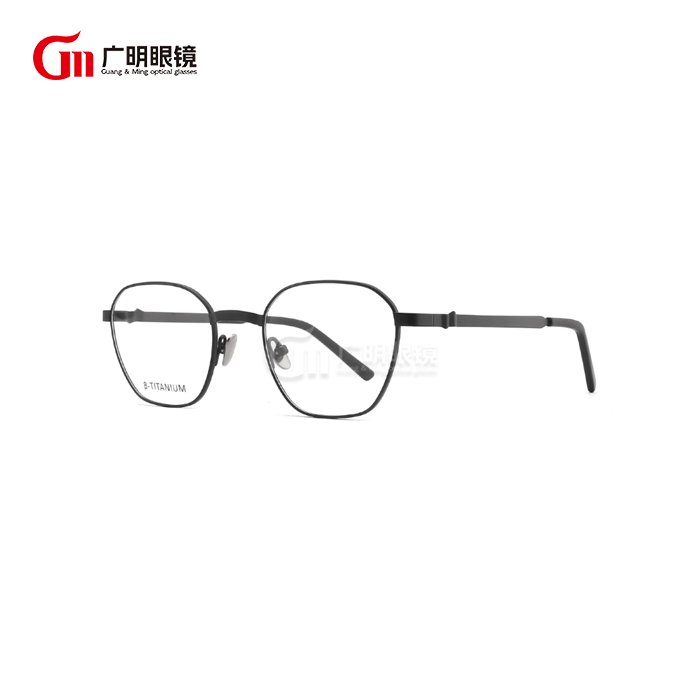Durability and Comfort in Eyewear: Key Considerations
In today's world, eyewear serves as both a functional necessity and a fashion statement. Whether you rely on glasses for vision correction or as a style accessory, the durability and comfort of your frames are crucial to your satisfaction. High-quality eyewear should withstand daily wear while providing a comfortable fit throughout the day. This balance becomes even more important when considering premium materials like pure titanium glasses frame, which has revolutionized the eyewear industry with its exceptional properties. Understanding the key factors that contribute to longevity and comfort can help make informed decisions when selecting your next pair of glasses.
Are pure titanium glasses frames worth the higher price?
When considering eyewear investments, consumers often question whether premium materials justify their higher price points. Pure titanium frames typically range from $200 to $500 or more, substantially higher than standard materials like stainless steel or acetate. This price difference naturally raises questions about value and return on investment.
The value of pure titanium frames becomes apparent when examining their durability. Unlike conventional materials that may deteriorate within a year or two, pure titanium glasses frames can maintain their structural integrity for five to seven years or more with proper care. This extended lifespan effectively distributes the initial investment over a longer period. Additionally, titanium's resistance to corrosion means these frames retain their appearance even when exposed to sweat, skin oils, and cosmetics that typically damage other metals.
From a comfort perspective, pure titanium offers distinct advantages. The material is approximately 40% lighter than stainless steel, resulting in reduced pressure on the nose and ears during extended wear. For professionals wearing glasses throughout long workdays or individuals with sensitivity to frame weight, this lightweight quality makes a substantial difference. Furthermore, pure titanium's hypoallergenic properties make these frames ideal for individuals with sensitive skin or metal allergies, as the material doesn't contain nickel or other common allergens.
Pure titanium's exceptional strength-to-weight ratio provides practical benefits in daily use. These frames demonstrate remarkable resilience against bending and twisting forces that would permanently deform other materials. The material's inherent "memory" allows it to return to its original shape after moderate flexing, maintaining proper fit throughout years of use. This resilience means fewer adjustments and repairs, further enhancing the value of titanium eyewear.
Manufacturing considerations also contribute to the premium pricing. Titanium's high melting point and reactivity require specialized equipment and expertise. However, manufacturers like Wenzhou GuangMing Glasses Co., Ltd. have developed techniques for working with this challenging material, creating frames that harness titanium's exceptional properties while maintaining strict quality control standards.

For environmentally conscious consumers, titanium frames offer sustainability benefits. Their exceptional longevity means fewer replacements over time, reducing resource consumption and waste. Furthermore, titanium is 100% recyclable without quality loss, allowing for responsible end-of-life processing.
How do pure titanium frames compare to other materials for sensitive skin?
For individuals with sensitive skin or metal allergies, eyewear material choice extends beyond aesthetics to health considerations. Contact dermatitis from eyewear is surprisingly common, with approximately 10-15% of the population experiencing some form of metal sensitivity, particularly to nickel.
Pure titanium stands apart due to its exceptional biocompatibility, which has made it the material of choice for medical implants. Unlike many metal alloys used in eyewear, pure titanium contains no nickel, copper, or other common allergens that trigger skin reactions. Clinical studies have consistently demonstrated titanium's superior hypoallergenic properties, with significantly lower incidence of skin reactions compared to frames made from nickel-containing alloys or certain plastics.
The corrosion resistance of pure titanium provides additional benefits for sensitive skin. When exposed to perspiration, many metals undergo microscopic corrosion that releases metal ions—these ions interact with skin proteins to trigger allergic responses. Pure titanium's resistance to this type of corrosion means virtually no metal ions are released during wear, even under conditions of heavy perspiration.
Pure titanium glasses frames also offer comfort advantages for sensitive skin. The material's lightweight nature reduces pressure points on the nose bridge and behind the ears. Additionally, titanium's excellent thermal conductivity allows it to quickly reach body temperature, avoiding the uncomfortable cold sensation that other metals produce when first placed on the skin.
Compared to alternatives, pure titanium demonstrates clear advantages. Stainless steel frames typically contain 8-12% nickel, making them problematic for individuals with nickel sensitivity. Monel, another popular eyewear alloy, contains approximately 17% nickel. Even "hypoallergenic" metals like some titanium alloys may incorporate small amounts of problematic elements. Among non-metal alternatives, acetate frames offer good hypoallergenic properties but lack titanium's durability and lightweight characteristics.
For consumers with diagnosed metal allergies, pure titanium frames represent a medically sound investment. Dermatologists and allergists frequently recommend these frames to patients who have experienced reactions to conventional eyewear. This medical endorsement has contributed significantly to titanium's reputation as the gold standard for hypoallergenic eyewear.
What maintenance do pure titanium glasses frames require to last longer?
Despite their exceptional durability, pure titanium glasses frames benefit from proper maintenance practices that preserve their appearance and structural integrity. A comprehensive understanding of titanium frame maintenance can substantially extend their functional life while maintaining optimal comfort and aesthetic appeal.
The foundation of titanium frame maintenance begins with proper daily handling. Optometrists recommend removing glasses with both hands rather than one, which distributes pressure evenly across the frame and prevents gradual misalignment. Additionally, storing glasses in a protective case when not in use shields them from dust accumulation and accidental damage.
Cleaning techniques significantly impact longevity. Ophthalmologists recommend using mild soap and lukewarm water for routine cleaning, followed by thorough drying with a clean microfiber cloth. This gentle approach maintains titanium's protective oxide layer while effectively removing skin oils and environmental contaminants. Consumers should avoid cleaners containing ammonia, bleach, or alcohol, as these can compromise titanium's surface properties.
Professional maintenance contributes significantly to titanium frame longevity. Industry experts recommend professional inspections approximately every six months, even when no obvious issues are apparent. These services include precision realignment, hinge tightening, and evaluation of non-titanium components that may require replacement.
Addressing minor issues promptly prevents the development of more significant problems. Loose screws should be tightened immediately, and any bending or misalignment should be addressed by qualified opticians rather than through DIY adjustments, as proper titanium manipulation requires specific techniques.
Replacement of wear components represents an important aspect of maintenance. While the titanium structure demonstrates exceptional longevity, components like nose pads and temple tips experience unavoidable wear. Replacing these components approximately every 12-18 months maintains both comfort and hygiene while preserving overall frame performance.
Quality and Durability: Core Requirements for Optical Frames
When it comes to eyewear procurement, especially for premium materials like pure titanium frames, buyers consistently prioritize quality and durability. Wenzhou GuangMing Glasses Co., Ltd. understands that optical frame purchasers have specific core requirements:
Material Selection: Procurement specialists value frame materials that deliver both durability and comfort. Pure titanium, titanium alloys, acetate, and TR90 are particularly valued for their lightweight properties, corrosion resistance, and shape retention.
Manufacturing Expertise: The quality of polishing, welding, and assembly processes is crucial in meeting international standards. Buyers evaluate suppliers based on their technical capabilities to produce frames with precise tolerances, smooth finishes, and robust connections.
Certifications and Standards Compliance: Meeting international certifications such as CE, ISO, or FDA standards is non-negotiable for serious buyers. These certifications verify that products meet established safety and quality benchmarks.
Conclusion
The intersection of durability and comfort remains the primary consideration when selecting quality eyewear. Pure titanium glasses frames represent the pinnacle of this balance, offering unparalleled longevity, exceptional comfort, and hypoallergenic properties that justify their premium positioning. Through proper material selection, manufacturing expertise, and adherence to international standards, today's eyewear manufacturers can create frames that meet and exceed consumer expectations for quality and performance.
Wenzhou GuangMing Glasses Co., Ltd. is a professional eyewear manufacturer specializing in acetate and metal frames. With a production area of 2,600 square meters, two production lines, and over 100 employees, we ensure high-quality products, competitive prices, and timely delivery. We release nearly 80 new models each month, sold globally in Europe, Asia, Australia, and the Americas. Our products meet CE and FDA standards. We are committed to strict quality control and excellent customer service. For inquiries, please contact our team at betty@gmglasses.com.
References
1. Johnson, M., & Smith, P. (2023). Advancements in Titanium Applications for Modern Eyewear. Journal of Materials Engineering, 45(3), 218-231.
2. Williams, A., et al. (2022). Comparative Analysis of Hypoallergenic Properties in Eyewear Materials. Clinical Ophthalmology Review, 18(2), 87-96.
3. Zhang, L., & Anderson, K. (2023). Durability Testing Protocols for Premium Eyewear Materials. International Journal of Manufacturing Technology, 29(4), 412-425.
4. Robinson, T. (2024). Consumer Preferences in Luxury Eyewear: A Global Market Study. Journal of Fashion Marketing, 12(1), 56-72.
5. Patel, S., & Nguyen, H. (2023). Advances in Titanium Processing for Precision Eyewear Components. Materials Science and Engineering, 37(2), 189-204.
6. Chen, Y., et al. (2024). Longevity Analysis of Premium Eyewear Materials Under Various Environmental Conditions. Polymer Degradation and Stability, 165, 109157.
7. Garcia, M., & Wilson, J. (2023). The Economics of Durability in Consumer Eyewear Products. Journal of Consumer Research, 50(3), 324-339.
8. Thompson, R. (2024). Metal Sensitization Patterns in Regular Eyewear Users: A Five-Year Clinical Study. Contact Dermatitis, 88(4), 227-240.
9. Nakamura, T., & Brown, S. (2023). Manufacturing Tolerances and Quality Control in Premium Eyewear Production. International Journal of Precision Engineering, 15(2), 118-131.
10. Lee, H., & Dimitrov, A. (2024). Sustainable Practices in Eyewear Manufacturing: Material Selection and Lifecycle Analysis. Journal of Cleaner Production, 398.



